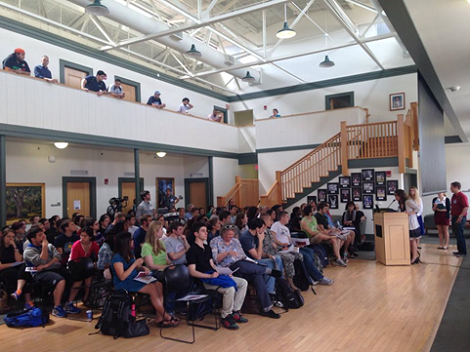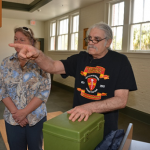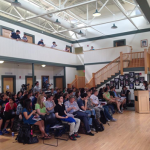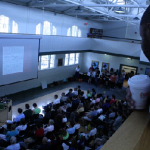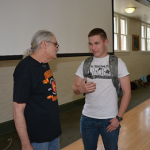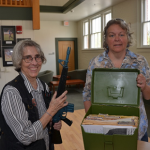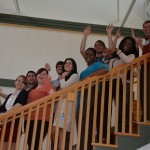March 12, “Scott Camil: Resistance & Liberation”
By Eugenia Hawk, Intern
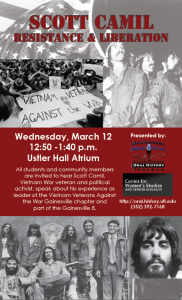
On March 12, 2014, SPOHP hosted a presentation by Vietnam veteran and political activist Scott Camil. The UF Center for Women’s Studies provided the beautiful Ustler Hall atrium, in which the demonstration took place, and by the time Camil began speaking, the entire room was packed with students and fellow activists.
Background: The 1973 Gainesville 8 Trials
Over the summer of 2013, Scott Camil and the other members of the Gainesville 8 Conspiracy gathered in Gainesville to commemorate the fortieth anniversary of the original trials. Camil was eager to share his newest collection of documents, given to him by a jury member of the trials, and after his presentation, donated the box full of notes, official documents, and newspaper clippings collected during the trial to UF for future research.
The Gainesville 8 trials took place in 1973 after the indictment of eight Veterans Against the War (VVAW) members on charges of conspiracy to disrupt the 1972 Republican Convention in Miami Beach. While planning a demonstration to be held at the convention, Camil, regional coordinator for the VVAW, received intelligence that the FBI was planning an assault in attempt to frame the demonstrators. Camil wrote up a plan of action in the case of interference, solely to protect the demonstrators. Camil and his fellow members each represented themselves in court and were found “not guilty” by the jury.
Event Presentation: Scott Camil and Gainesville 8 Documents
Opening up to a Q&A, Camil gave the opportunity for students to ask questions. Some questions were directed at the situation between the witnesses and the defendants of the trial, while some questioned the brevity of the anti-war movement during that time. As one can denote, during the early 1970s the American public began to show distrust in the government, as they seemed to be hiding key elements to the reality of the Vietnam War. Videos and photographs of the situation in Vietnam began to flood the media, and the harsh circumstances of the war did not reflect the optimistic reassurance by government officials that the US was providing aid to Vietnam.
By the time of Nixon’s infamous Watergate Scandal, the anti-war movement was thriving and many were pushing for the withdrawal of American troops from Vietnam. The strongest of voices came from veterans themselves, who could tell first hand experiences of the terrible treatment of the Vietnamese by American troops. In efforts to thwart the protests of veterans, such as in the case of the Gainesville Eight, government agencies developed various methods to attempt to discredit the veterans. When hearing Camil’s story of the jury that overlooked his case, it is obvious which side the majority of the American public was on in the matter of the Vietnam War.
Event Gallery
Camil’s presentation also provided insight in issues such as government spying. He indicated that back in the 1970s, there was more personal freedom, but now the government has access to all our information. Our phone calls, text messages, emails, and even security data, as mentioned by Camil, have been monitored by the government. His emphasis on patriotism and the protection of democracy resonated throughout the presentation.
Scott Camil devoted his last twenty minutes to provide information on his current activism. He started the Veterans for Peace Gainesville chapter, and touched on some personal topics, such as his trip to Isreal and his support of the Palenstinians, and also gave advice to students looking to become involved in local matters. One of which, Stand By Our Plan, defends the Alachua County Comprehensive Plan, which protects the wetlands and ecosystems of Alachua County, from being overthrown by major development plans.
Sponsors
The event was sponsored by SPOHP and the UF Center for Women’s Studies. Spring 2014 interns of SPOHP coordinated the event, successfully recruiting a large student audience, securing a venue, creating and disbursing posters and flyers, and setting the stage for one terrific guest speaker.
Photos by Cornelius Clayton.
